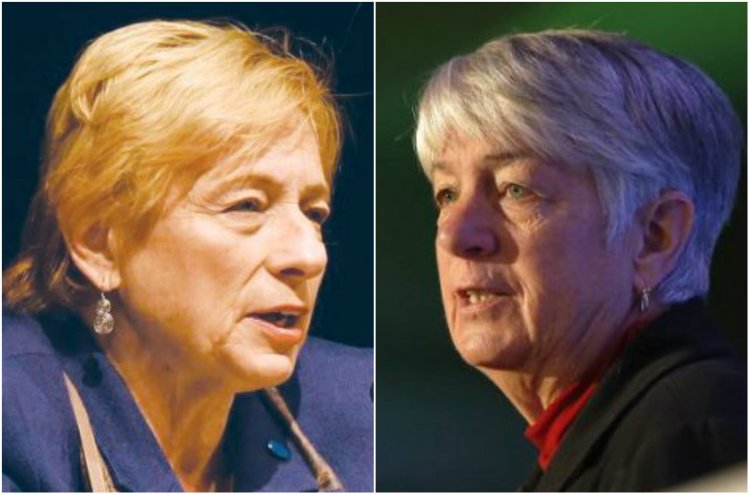The Maine Republican Party just made a $1.8 million ad buy in the governor’s race, narrowing the spending gap between party-backed political committees and bringing total outside spending to almost $7 million.
Virtually all of the money in the latest Republican expenditure, $1.7 million, is for television ads opposing Democrat Janet Mills, according to reports filed with the state ethics commission. It also includes an $80,000 ad buy opposing independent candidate Terry Hayes, the state treasurer.
It’s the first time outside money has been spent opposing one of the independent candidates.
Polls show Mills, the state attorney general, and Republican Shawn Moody, who owns a chain of auto body repair shops, leading the four-way race to succeed Gov. Paul LePage, who is termed out. Hayes and Alan Caron, an economic development consultant, are both running as independents.
The Maine Republican Party ad buys bring the group’s total spending in the race to $2.7 million. That’s still short of the roughly $4 million spent by a half-dozen Democrat-backed groups.
Earlier this week, the Maine Conservation Voters Action Fund, fueled by cash from the national League of Conservation Voters, reported a series of ad buys for about $715,000, virtually all of it for online and television ads opposing Moody.
So far, outside spending on the governor’s race is about $1 million more than at the same time in the 2014 campaign.
In that race – between LePage, Democrat Mike Michaud and independent Eliot Cutler – there had been $6.2 million in outside spending by Oct. 3, with the largest PAC expenditure of $2.3 million by the Republican Governors Association.
So far, the current gubernatorial race between the four contenders has been described as “low key” in person, but the outside spending has been mostly spent on attack ads.
Of the roughly $7 million spent so far, $2.9 million was spent opposing Moody and $419,000 supporting him; and $2.3 million opposing Mills and $1 million supporting her.
That’s a big change from the 2014 race, when outside money was more equally distributed between supporting and opposing candidates.
In that race in early October, there had been $1.6 million spent opposing LePage, and $1.3 million supporting him; $1.1 million opposing Michaud and $1.8 million supporting him.
The opposition ads this year include Democrat-backed ads homing in on Moody referring to Maine schools as “overfunded.” He has since spent time explaining that his fuller answer was that he wanted the schools to operate efficiently. In the primary, Mills faced “lockdown” attack ads highlighting her former high rating from the National Rifle Association – which dropped to an F midway through the primary.
The Hayes campaign said the ad targeting her, which features negative messages about both Hayes and Mills before touting Moody as a successful small businessman, makes false claims and won’t prompt her to change her stance against negative campaigning.
“Maine politics has become all about partisan fighting and keeping score,” Hayes said in a statement about the ad. “I have never participated in a negative ad, and I never will.”
The outsized amount of Democrat-backed money amid campaign committees is mirrored by the fundraising trends by the campaigns. As of the most recent finance reports, filed in late September, Mills had raised a total of $1.8 million for the race, to Moody’s $1.4 million.
Aside from the Maine Republican Party PAC, the other major outside spending organizations are all backed by Democrats.
A Better Maine, which has spent $1.9 million, is backed by the Democratic Governor’s Association. Earlier this year, the DGA announced it planned to spend $20 million in gubernatorial races in eight states – including Maine – that could determine which party has control over drawing electoral boundaries in 2021. Congressional redistricting is only done once each decade and Maine is among 26 states where the governor has the power to approve or reject congressional maps that will be redrawn after the 2020 Census.
Priorities USA Action, which has spent $854,000 mostly on social media buys, is backed by a national Democratic super PAC of the same name. The $18 million super PAC has received $6 million in contributions from Donald Sussman, a financier, philanthropist and former owner of the Portland Press Herald, and $5 million from billionaire business magnate George Soros this year alone, according to the Federal Election Commission.
Other PACs spending more than $200,000 on the governor’s race include Citizens Who Support Maine Public Schools, backed by the National Education Association and the Maine Education Association; and Maine Women Together, backed by a super PAC called Women Vote!, backed by Emily’s List and major individual donors including Sussman ($2.5 million.)
Staff Writer Noel K. Gallagher can be contacted at 791-6387 or at:
Twitter: noelinmaine
Send questions/comments to the editors.




Comments are no longer available on this story